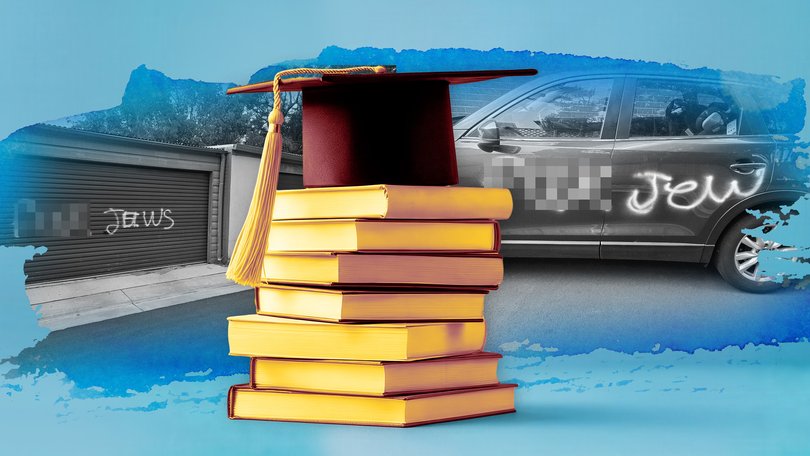DVIR ABRAMOVICH: As anti-Semitism evolves, so must we
DVIR ABRAMOVICH: A one-size-fits-all approach to racism doesn’t work when trust is fragile.

It started, as it often does, with a well-meaning statement.
Australian National University, in response to a national conversation about anti-Semitism, assured the public it was committed to “anti-racism”.
But when asked to adopt the International Holocaust Remembrance Alliance definition of anti-Semitism, a definition embraced by democracies around the world and recently endorsed by 39 Australian universities, ANU declined.
Sign up to The Nightly's newsletters.
Get the first look at the digital newspaper, curated daily stories and breaking headlines delivered to your inbox.
By continuing you agree to our Terms and Privacy Policy.Instead, it offered an abstraction: a general policy. One size fits all. Trust us.
But we live in a moment when trust is fragile.
When thousands march through city streets chanting slogans that leave Jewish Australians feeling unsafe.
When students report Nazi salutes in meetings.
When calls for the elimination of the world’s only Jewish state are met not with thoughtful debate, but applause.
This isn’t just a Jewish issue.
It’s a civic issue.
When anti-Semitism rears its head, whether in slogans, slurs, or silence, it’s a warning flare for the health of the broader democratic culture.
How we treat Jewish students today is a bellwether for how we’ll handle pluralism tomorrow.
At a time like this, abstractions are not enough.
The IHRA definition is not perfect. No definition is.
But it is precise where precision is needed, and it is clear where too many university statements have been muddled. It acknowledges that anti-Semitism has adapted to the modern era.
That it now often appears cloaked in anti-Zionist language.
That, yes, criticism of Israel, like any nation, must be protected. But when that criticism crosses into demonisation, when it denies Jews the right to collective self-determination, or when it holds Jews everywhere responsible for the actions of the Israeli Government, that is no longer politics. That is hate.
A general anti-racism policy may look good on paper, but it does not help the Jewish student who hears ‘Zionists out’ screamed in a lecture theatre.
And yet, some university leaders remain paralysed.
They worry that adopting IHRA will open them to accusations of censorship or political bias.
But clarity is not censorship. Defining a problem is the first step toward solving it. Moral confusion is not a virtue. It is a vacuum that gets filled with noise, fear, and eventually extremism.
The Australian university sector recently endorsed a new national definition that, admirably, echoes many of IHRA’s principles.
It affirms that anti-Semitism can include calls for Israel’s destruction and the substitution of “Zionist” for “Jew.”
It was the product of months of consultation, including with Jewish community groups, and represents a homegrown attempt to navigate this complex terrain.
But the ANU’s recent refusal to commit even to this more measured step is telling. It signals a reluctance to name anti-Semitism plainly. It suggests discomfort with acknowledging that Jewish students face a unique and rising threat.
Why does this matter?
Because universities are not just forums for ideas.
They are moral ecosystems. And in moral ecosystems, silence is never neutral.
It communicates who belongs and who doesn’t. Who is protected and who is peripheral.
And if a moral ecosystem consistently leaves one group vulnerable, excluded, or unacknowledged, then it has failed at one of its most basic tasks. It is no longer fostering a learning environment grounded in equality and safety.
I’ve spent decades listening to students and university leaders across continents.
I’ve seen how hard it is to balance academic freedom with moral clarity.
But this is not a test of speech.
This is a test of courage.
The IHRA definition has been adopted by more than 40 countries, by the European Parliament, by universities in the UK, Canada, and the US.
It has been endorsed by the United Nations’ own special rapporteur on freedom of religion.
These are not authoritarian regimes policing thought. These are liberal democracies saying, “We have learned from history. And we will not let its darkest chapters be repeated in the shadows of our lecture halls”.
What is lost when a university like ANU hedges? Not just Jewish trust. But the moral authority of the institution itself.
A general anti-racism policy may look good on paper, but it does not help the Jewish student who hears “Zionists out” screamed in a lecture theatre.
It does not help the academic who is told their identity makes them complicit in genocide.
It does not help the community watching universities contort themselves to avoid the discomfort of saying anti-Semitism is not hypothetical. It is here.
Adopting the IHRA definition does not mean banning protest. It does not mean outlawing criticism. It means giving universities a sharper lens. It means saying, clearly and calmly, that the oldest hatred in the world has evolved.
We must evolve with it.
Universities should not be in the business of moral evasion.
They should be in the business of truth-telling. In this moment, truth requires naming anti-Semitism not just in its historical forms but in its current expressions. The IHRA definition does that. Institutions that care about inclusion, about the psychological safety of all students, and about the integrity of public discourse should welcome it.
In times of polarisation, institutions reveal who they are by what they are willing to define. Let ANU, and every university still hesitating, decide what kind of institution it wants to be.
Because the world is watching. And so are the students walking your campus, wondering whether you see them.
